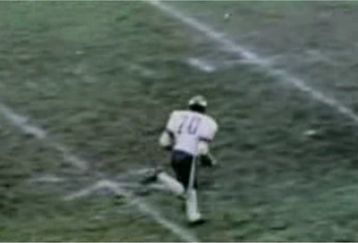The Most Embarrassing Moment in NFL History
Jim Marshall was a defensive lineman drafted in the NFL in 1960 by the Cleveland Browns. In 1961 he was traded to the Minnesota Vikings and played for them for an inconceivable 18 years–starting in 270 consecutive games. Jim play in two Pro Bowls and in four Super Bowls. However, Jim may be best known for what is considered by many to be the most embarrassing moment in NFL history. Four years into his NFL career in a game against the San Francisco 49ers, Jim recovered a fumble and ran for what he thought was a touchdown. Jim looked to the sideline and quarterback Fran Tarkenton yelled, “Jim, you ran the wrong way!”
Jim was devastated with shame, having scored for the wrong team in front of millions on national TV.
But what happened during halftime was amazing...
Jim said,
It was right before halftime and I could hide in the locker room... Coach Norm Van Brocklin, who was normally anything but sympathetic said, ‘Beanpole, don’t worry. If it wasn’t for what your did we wouldn’t have done zip, cause no one else out there did a damn thing!’
I was real down. And I was terrified. I hurt the team and I knew when I went back out on the field I was going to be faced with ridicule and humiliation. It was then that I remember what my father and grandfather taught me: ‘Be responsible. If you make a mistake, you got to make it right.’ I realized I had a choice. I could sit in my misery or I could do something about it.
Jim made the choice to look forward, to create his future and during the second half of the game played some of the best defense of his life and helped the Vikings win 27-22.
He didn’t stop there. He became a champion for those who lived through their own shameful experiences. He spoke to groups about his choice to "make it right." He corresponded with people who sent letters admitting their own shameful experiences. He worked to develop his awareness and focus on the football field. He didn’t let a incredibly embarrassing moment take control of him. He used the experience to his advantage, he learned from it and became better as a result.
How do we let our own shame keep us from learning from our errors, public or private?
As leaders, do we shame and embarrass others when they make mistakes? Or do we create an environment where they can learn and grow?

